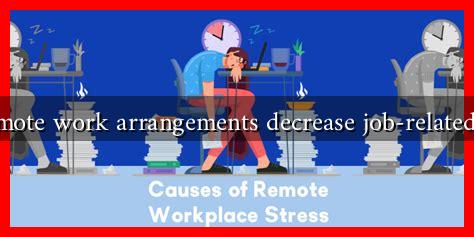-
Table of Contents
Can Remote Work Arrangements Decrease Job-Related Stress?
In recent years, remote work has transitioned from a niche arrangement to a mainstream practice, especially accelerated by the COVID-19 pandemic. As organizations adapt to this new normal, a pressing question arises: can remote work arrangements decrease job-related stress? This article explores the relationship between remote work and stress levels, examining the benefits, challenges, and real-world examples that illustrate this evolving work paradigm.
The Benefits of Remote Work on Stress Reduction
Remote work offers several advantages that can contribute to lower job-related stress. Here are some key benefits:
- Flexibility: Remote work allows employees to create their own schedules, which can lead to a better work-life balance. This flexibility enables individuals to manage personal responsibilities alongside their professional duties, reducing stress.
- Elimination of Commute: One of the most significant stressors for many employees is the daily commute. Remote work eliminates this factor, saving time and reducing the anxiety associated with traffic and public transportation.
- Personalized Work Environment: Working from home allows individuals to create a workspace that suits their preferences, whether that means a quiet room, a cozy corner, or even working from a café. A comfortable environment can enhance productivity and reduce stress.
- Increased Autonomy: Remote work often comes with greater autonomy, allowing employees to take ownership of their tasks. This empowerment can lead to increased job satisfaction and lower stress levels.
Challenges of Remote Work and Potential Stressors
While remote work has its advantages, it also presents unique challenges that can contribute to stress:
- Isolation: Remote workers may experience feelings of loneliness and isolation, which can negatively impact mental health. The lack of social interaction with colleagues can lead to decreased morale.
- Blurred Boundaries: The line between work and personal life can become blurred when working from home. This can lead to overworking and burnout, as employees may feel compelled to be “always on.”
- Communication Barriers: Remote work can hinder effective communication, leading to misunderstandings and frustration. The absence of face-to-face interactions can complicate collaboration and team dynamics.
Case Studies and Statistics
Several studies have examined the impact of remote work on stress levels. A survey conducted by Buffer in 2021 found that 20% of remote workers reported feeling lonely, while 18% cited difficulties in collaboration and communication as significant challenges. However, the same survey revealed that 32% of respondents felt that remote work improved their overall well-being.
Another study by the American Psychological Association (APA) found that employees who worked remotely reported lower stress levels compared to their in-office counterparts. The APA noted that remote workers experienced less job-related anxiety and had higher job satisfaction rates.
Real-World Examples
Many companies have embraced remote work and witnessed its positive effects on employee well-being. For instance, GitLab, a fully remote company, has reported high employee satisfaction and low turnover rates. Their emphasis on communication and collaboration tools has helped mitigate feelings of isolation among team members.
Similarly, Buffer, a social media management platform, has adopted a remote-first approach and has seen a significant increase in employee happiness and productivity. Their commitment to transparency and regular check-ins has fostered a supportive remote work culture.
Conclusion
In conclusion, remote work arrangements can indeed decrease job-related stress for many employees, primarily through increased flexibility, elimination of commutes, and personalized work environments. However, it is essential to recognize the challenges that remote work can pose, such as isolation and blurred boundaries. Organizations must implement strategies to address these challenges, such as promoting regular communication and fostering a sense of community among remote workers.
As the future of work continues to evolve, understanding the impact of remote work on stress levels will be crucial for both employers and employees. By leveraging the benefits while addressing the challenges, companies can create a healthier, more productive work environment for their teams. For more insights on remote work and employee well-being, visit American Psychological Association.

